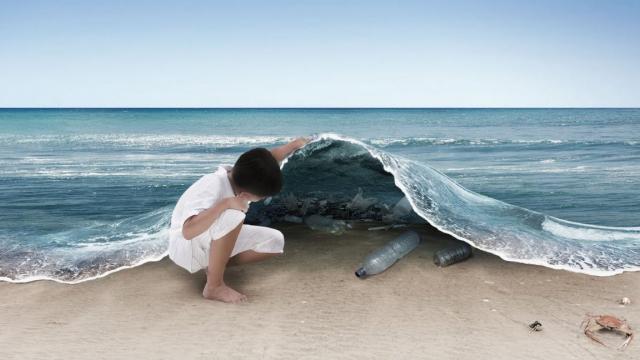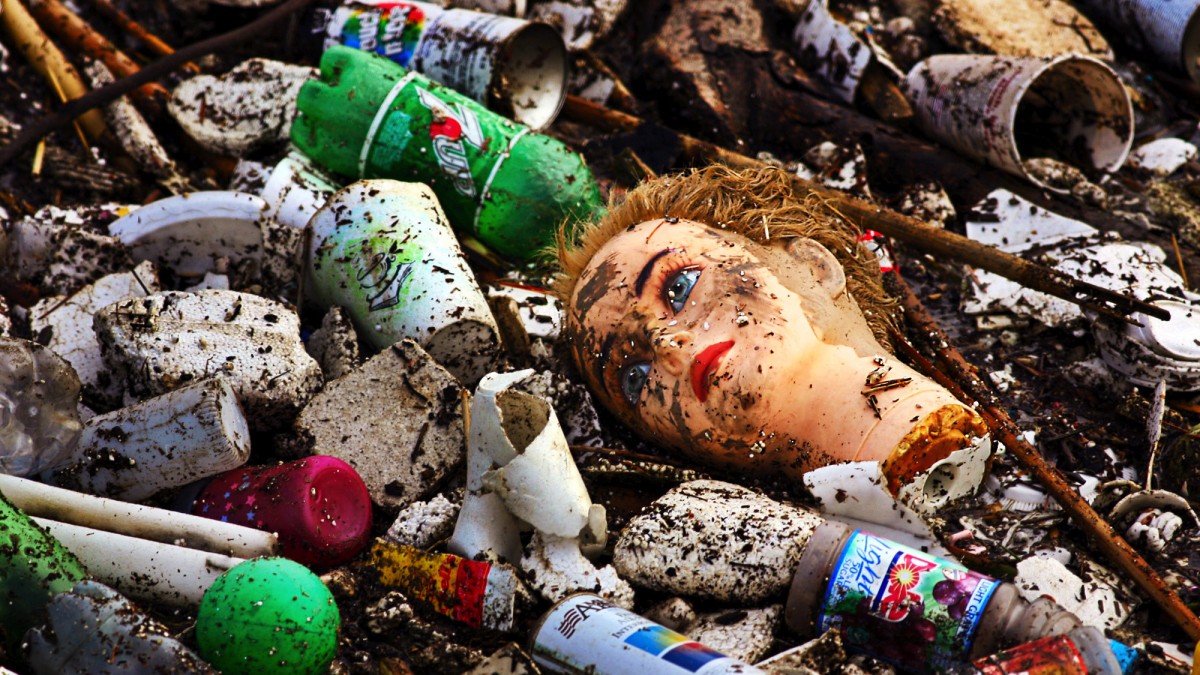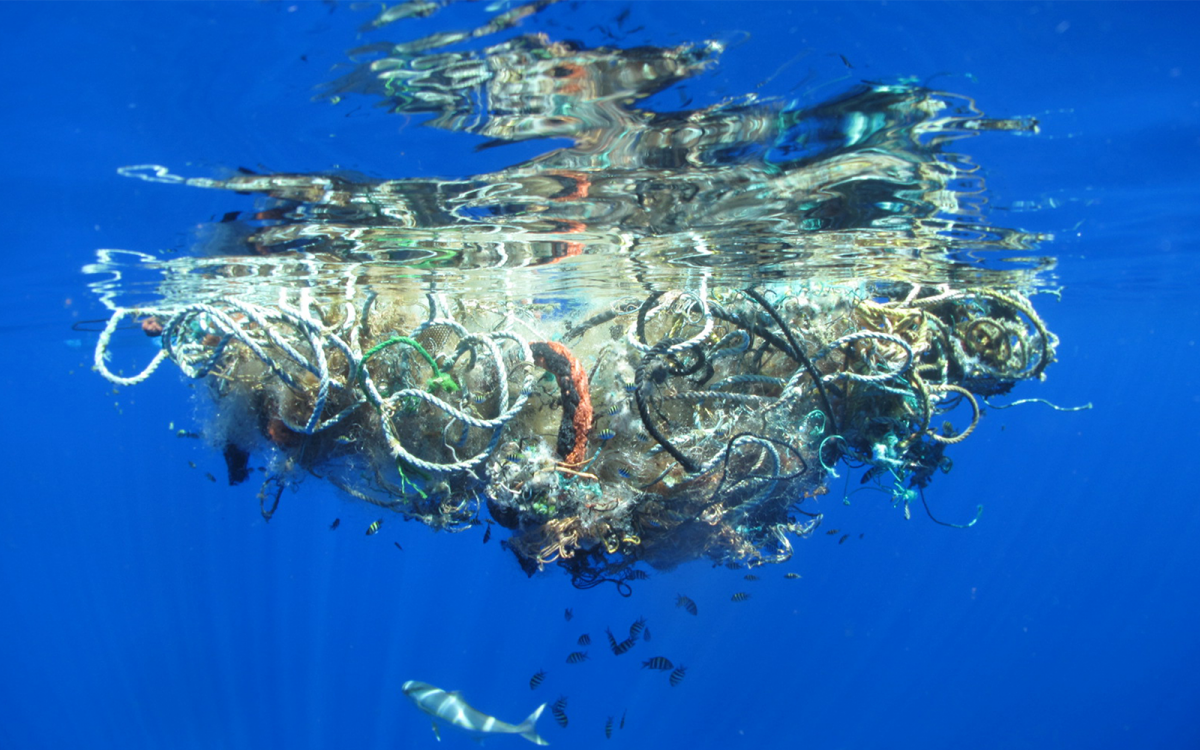
Plastic pollution threatens all life. We need to rethink the way we live and challenge corporate power pushing our throw-away business-as-usual model. Like tackling climate change, a world not polluted by plastic is possible.
Our Planet's Plastic Crisis
Home to 80 percent of life, the ocean is choking in plastic. Broken down microplastic particles are becoming ever more prevalent in the water cycle – a potential threat to almost all life, including humans.
Plastic mass production began some six decades ago, but the material can take half a millennium to degrade. The earth's spin, winds and water currents cause five separate ocean vortexes, and plastic debris accumulates in these super-garbage patches — what have become growing asteroid belts of trash, a thickening microplastic soup enveloping the earth.
Between Hawaii and California, the biggest patch extends 1.4 million square miles, an area larger than India. The other four patches are located in the South Pacific, Indian Ocean, Northern and Southern Atlantic.
Because the Arctic does not rotate like the other largest bodies of water, plastic distributes evenly there. Recent studies concluded the region contains three billion plastic pieces. It speaks volumes that this remote, mainly land-locked and relatively uninhabited body of water is quickly turning into a rubbish dump.
However, it is the isolated Henderson Island in the Pacific that now qualifies as "the most polluted place on earth". In total, an estimated 12 million tons of plastic is dumped here globally per year. The scene is similar in the northwestern Atlantic.
"We took Belugia II [one of Greenpeaces boats] up the West Coast of Scotland. Even in the remote Outer Hebrides we were stunned. There's few people, but so much plastic," explained Tisha Brown, an ocean campaigner with Greenpeace U.K.
Brown highlighted that the equivalent of one rubbish truck of plastic is dumped into the ocean worldwide every minute. Data shows that up to 90 percent of sea birds have ingested plastic, and the waste isn't just impacting animals. Plastic travels up the food chain via sea creatures, and into the larger water cycle, including human agriculture and drinking water.
But despite the daunting challenge, Brown said there are many ways to solve the plastic crisis. "As individuals, reducing your plastic footprint is important, for instance swapping plastic for cloth bags, not using plastic spoons and straws. Clean-up is crucial, too, but the analogy we like to use is if your basin is overflowing, you turn off the tap before mopping the floor."
To stop the flow, Greenpeace's is currently campaigning for anti-pollution legislation and targeting specific corporations.
"We focus on the largest soft drinks company, Coca-Cola. Plastic bottles are one of the most common items found during ocean and beach cleans. We estimate Coca-Cola produces over 110 billion single-use plastic bottles per year," she said. "We call on them to change the way they deliver products to people."
Coca-Cola neither confirmed nor denied this figure.
Recently, Greenpeace turned London's central Piccadily Square into a spoof ad, where it became a scene for a replica polar bear drowning in Coke bottles. Meanwhile, the Beluga II trip was part of a campaign to encourage the Scottish government to reduce plastic pollution by introducing a Deposit Return Scheme (DRS) whereby shoppers get reimbursed for every bottle returned to a shop. So far, the campaign is succeeding.
Turning off the Tap: Europe and the U.S.
After writing and petitioning, Greenpeace met with Scottish Cabinet Secretary for Environment Roseanna Cunningham. The next day, Scotland agreed to investigate implementing DRS. Two factors encouraged the swift decision: In Scotland there is a pro-environmental cross-party consensus on the need to reduce waste, and Greenpeace revealed how Coca-Cola was covertly lobbying against the DRS, which pressured the company to cease.
Deposit Return Schemes work. Germany recycles over 90 percent of plastic bottles through these programs. Denmark, Finland, Sweden and Norway have similar results. In comparison, the U.S. and U.K., both without DRS, fail to reach half those amounts.
As a result, Greenpeace along with a wider alliance is pushing for a DRS scheme to be implemented across the UK, a plan now being discussed in Westminster. However, it is facing strong resistance from supermarkets, fast-food giants and big soda. But last month, two supermarkets, Cooperative and Iceland, announced support for the plan.
In comparison, in the U.S., 10 states have "Bottle Bills", or the equivalent of DRS. As a result, recycling levels in those states are far closer to northern European countries than the rest of the U.S. American citizens get less reimbursement than Europeans, so increasing the payback could increase the return. But again, the main opposition to Bottle Bills is coming from Coca-Cola and other major corporations with vested interests in maintaining the plastics-intensive status quo.
Looking Globally
The majority of plastic pollution comes from south and east Asian countries, especially India and China. One reason for this is that the poorest people in these countries use a great deal of single-use small bottles.
But blame, according to Greenpeace and other campaigners, should again focus on global corporations, not individual consumers. Brown explained that Coca-Cola and other corporations are trying to introduce more single-use plastic bottles to countries like India, which currently collects and refills glass bottles.
In addition, these nations, through outsourcing, produce a lot of items consumed in the West. This leads to high plastic pollution, just as their greenhouse gases are in large part driven by Western consumption of goods produced in their land. The West also ships tons of waste plastic in their direction for recycling. In the last year, both China and India have announced bans on imported waste plastic, since the countries already have too much to cope with. This will force low-recycling nations, such as the U.S. and U.K., to find something else to do with their waste – like turning to DRS – while reducing global shipping in the process.
Removing Ocean Plastic
Removing plastics without harming sea life seems an insurmountable challenge. One solution came from a Dutch 16-year-old named Boyan Slat. Slat, who is now 23, proposed using the sea currents and nets designed to syphon the garbage without catching marine life.
Another important action is beach cleanups, to both remove plastic and engage the community. Greenpeace organized beach cleans on their Scottish trip, and Brown said that auditing the waste and shaming the corporations that littered most of the trash helped add another element to the cleans.
Across the UK., environmentalists with Surfers Against Sewage (SAS) organized 17,000 people in the 2017 Spring Beach Clean. SAS started in the early 1990s campaigning against raw sewage dumped straight into the sea. Through direct action, protests and campaigning, the group forced the U.K. and E.U. governments to legislate so all European sewage gets properly treated. Since then SAS has switched to fight plastic, seeing it as the biggest threats to ocean health.
If more people took that view – and took similar action – the fight to free the world's seas of plastic would become that much more winnable.
3 WAYS TO SHOW YOUR SUPPORT
- Log in to post comments















